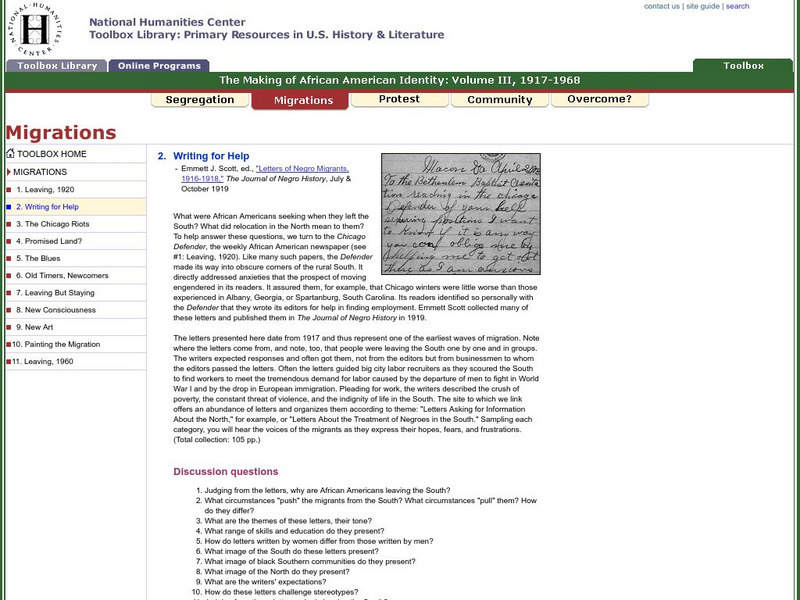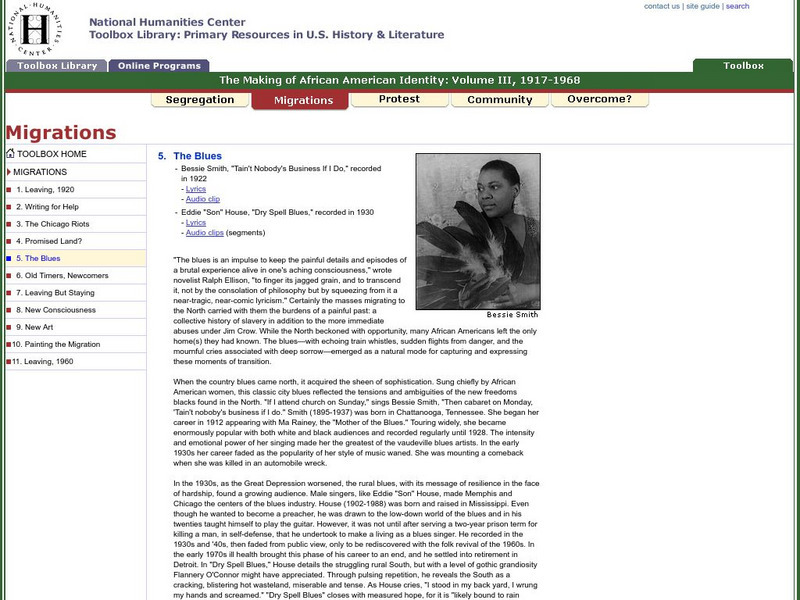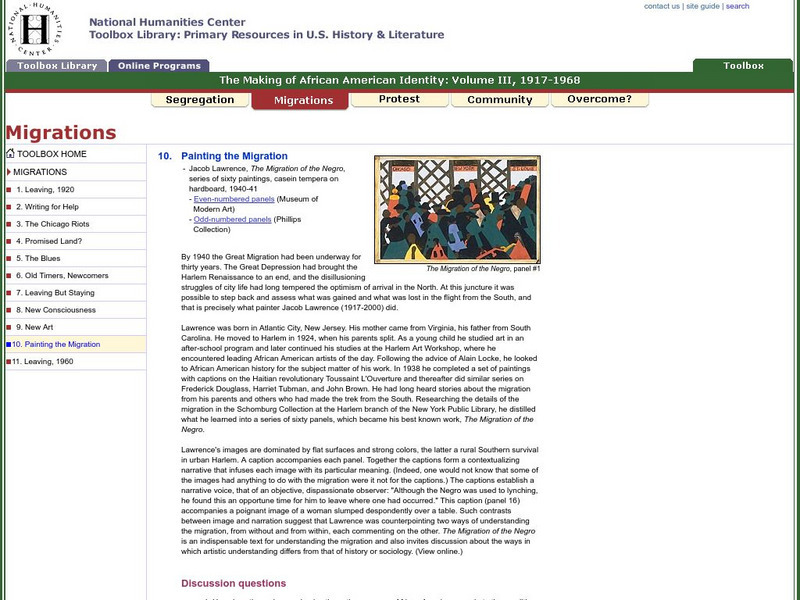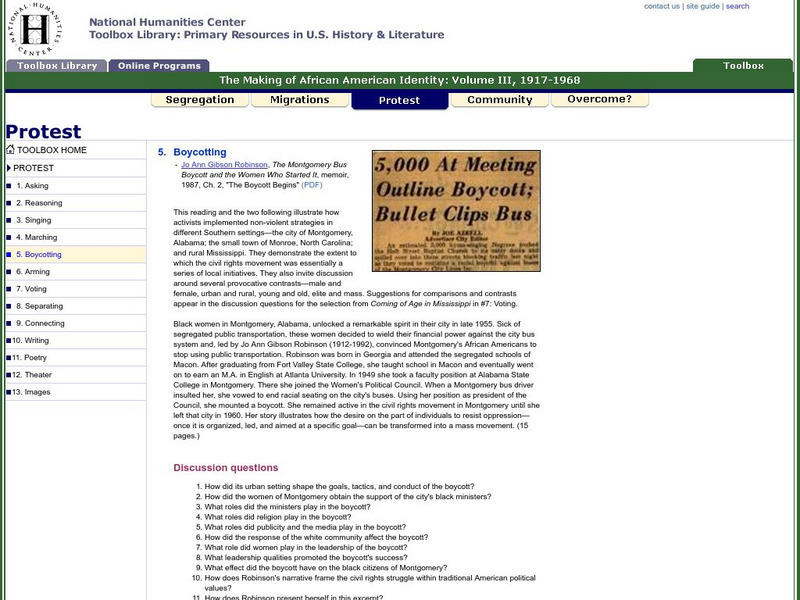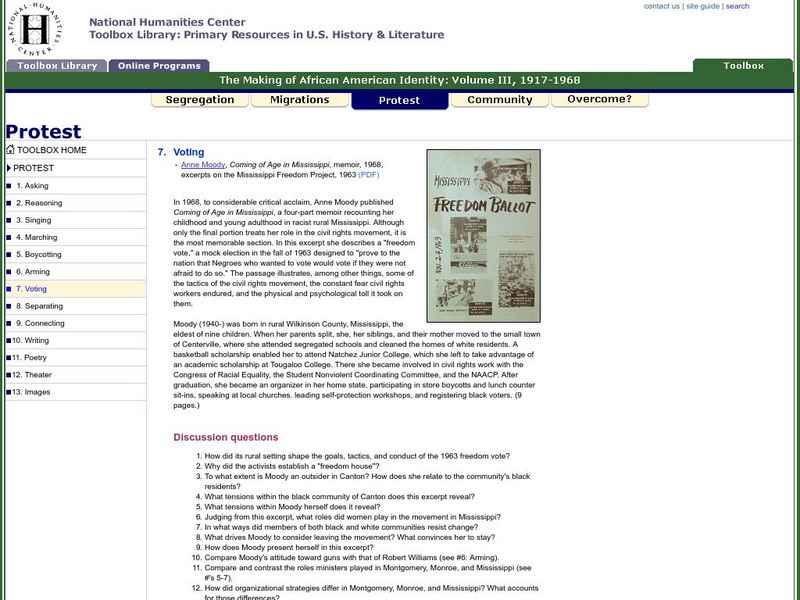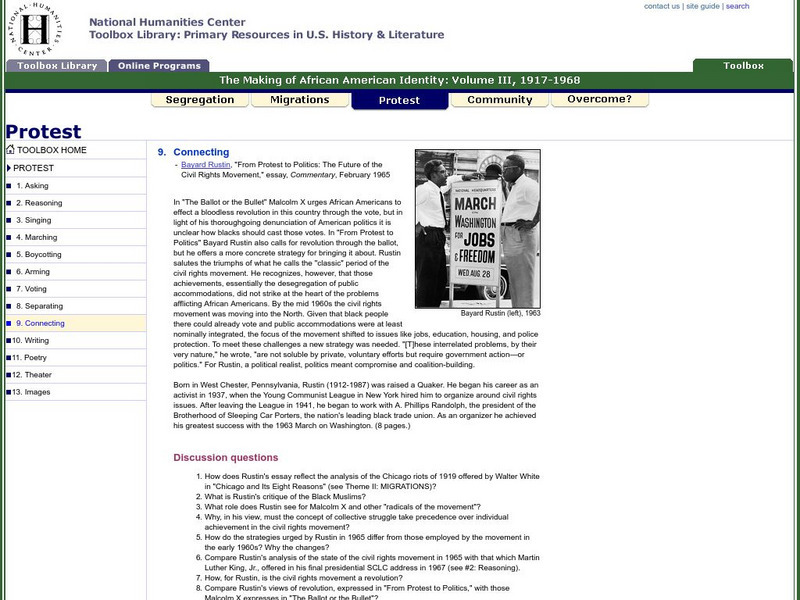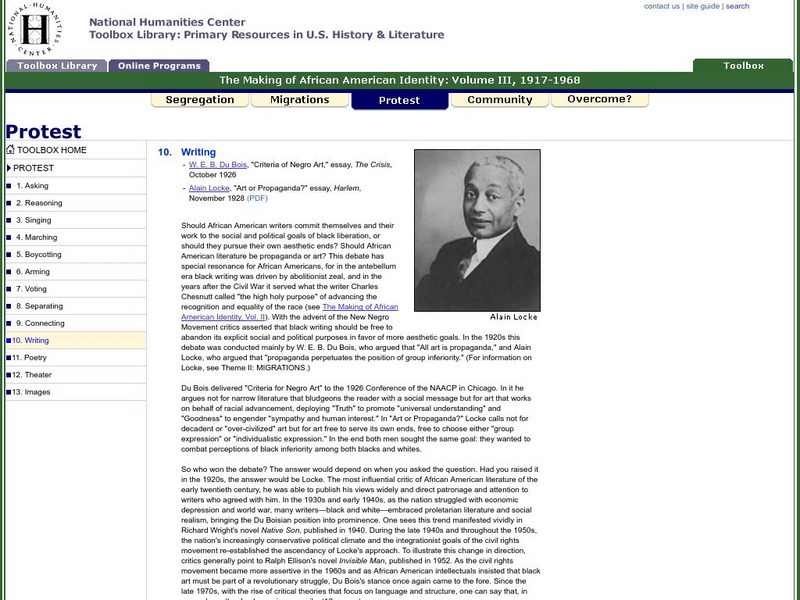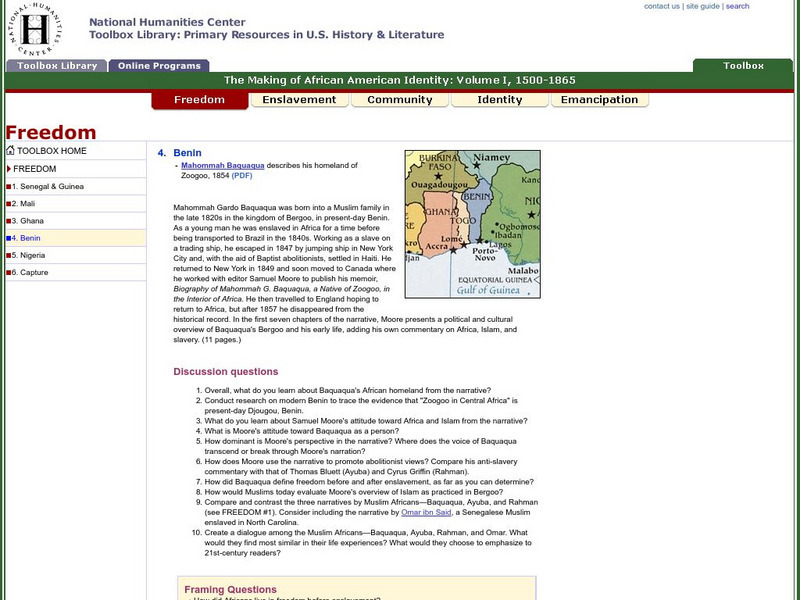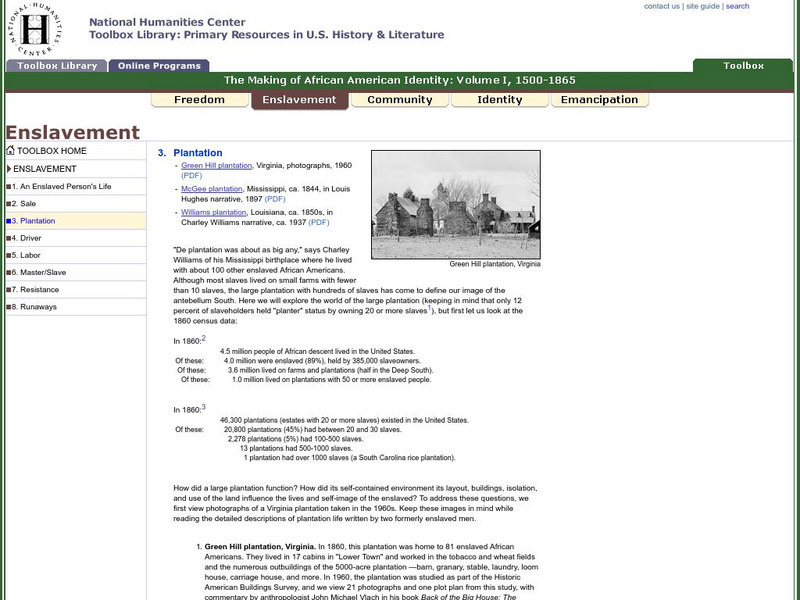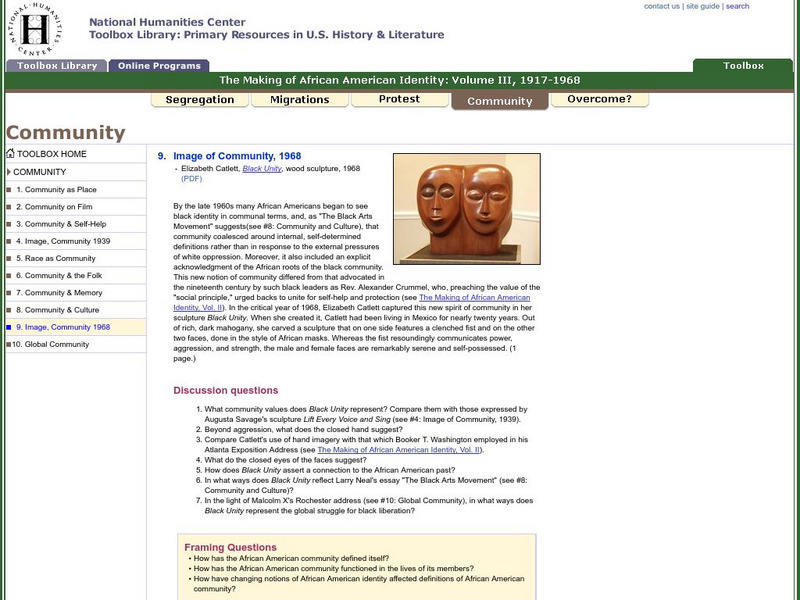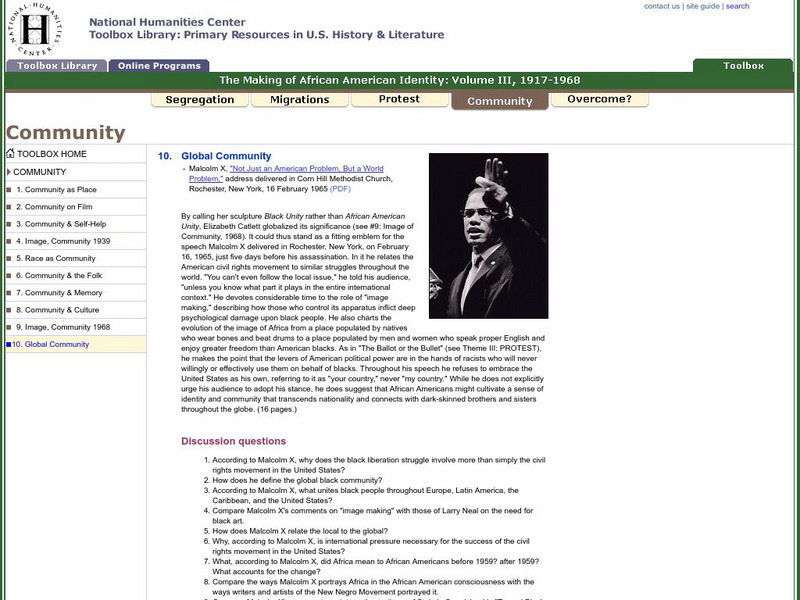National Humanities Center
National Humanities Center: Toolbox Library: Making of African American Identity: Migrations: Negro Migration During War
An analysis of the reasons why blacks moved north around the time of World War I. An article by Emmett J. Scott (1873-1957), who for a time served as Booker T. Washington's personal secretary, is linked to this resource.
National Humanities Center
National Humanities Center: Toolbox Library: Writing for Help, Making of African American Identity: V. 3
Letters by African Americans seeking help to leave the South. They explore issues including identity, family, community, and the struggles induced by the need to migrate north.
National Humanities Center
National Humanities Center: Toolbox Library: Making of African American Identity: The Blues
Examples of the blues inspired by the African American migration to Northern cities. These lyrics and audio clips explores the reasons for, and effects of, these migrations.
National Humanities Center
National Humanities Center: Toolbox Library: Making of African American Identity: Old Timers, Newcomers
An editorial cartoon and a newspaper article illustrating the tensions between members of established African American communities in the North and Southern migrants. Links to both resources are provided within this site.
National Humanities Center
National Humanities Center: Toolbox Library: Making of African American Identity: Painting the Migration
Paintings by Jacob Lawrence titled, "The Migration of the Negro", a series of sixty paintings, illustrates the migration of African Americans to the North in the twentieth century. A link to this artwork can be found within this summary.
National Humanities Center
National Humanities Center: Toolbox Library: Marching, Making of African American Identity: V. 3
This resource by the National Humanities Center discusses the role of physical protest in the civil rights movement. Its primary focus, the print "Freedom Now," by Reginald Gammon (1921-2005), depicts the massing of bodies in the name of...
National Humanities Center
National Humanities Center: Toolbox Library: Boycotting, Making of African American Identity: V. 3
A memoir describing the 1955 Montgomery bus boycott by Jo Ann Gibson Robinson titled, "The Montgomery Bus Boycott and the Women Who Started It." This text describes the importance of African American women in initiating the well-known...
National Humanities Center
National Humanities Center: Toolbox Library: Voting: Making of African American Identity: V. 3
The efforts to secure African American voting rights in Mississippi are described within this resource. Anne Moody's, "Coming of Age in Mississippi", a four-part memoir recounts her childhood and young adulthood in racist rural Mississippi.
National Humanities Center
National Humanities Center: Toolbox Library: Connecting: Making of African American Identity: V. 3
An article that makes a case for black engagement with the American political system. This resource provides a link to Bayard Rustin's "From Protest to Politics", where he encourages African Americans to begin a "revolution through the...
National Humanities Center
National Humanities Center: Toolbox Library: Writing, Making of African American Identity: V. 3
Articles that examine the goals of black literature. It primarily focuses on the advent of the New Negro Movement and critics assertion that black writing should abandon its explicit social and political purposes in favor of more...
National Humanities Center
National Humanities Center: Toolbox Library: Images, Making of African American Identity: V. 3
This article review examples of black protest in art by Claude Clark and Charles White. Links to images and supplemental resources are provided here as well.
National Humanities Center
National Humanities Center: Toolbox Library: Senegambia, Making of African American Identity: V. 1
Drawings of West Africans and two accounts of Africans before enslavement, one by an African of Gambia, one by a French traveler to Senegal. They examine how Africans lived in freedom before enslavement.
National Humanities Center
National Humanities Center: Toolbox Library: Sierra Leone, Making of African American Identity: V. 1
An eighteenth-century map, several illustrations by Europeans of Africans from Sierra Leone, and two eighteenth-century narratives depicting Sierra Leone natives through the eyes of two British physicians who describe the peoples they...
National Humanities Center
National Humanities Center: Toolbox Library: Community on Film, Making of African American Identity: V. 3
Excerpts from a 1941 film that depicts black and white communities in Kannapolis, NC, by H. Lee Waters (1902-1997). This two part film characterizes the differences in economy, community, and values of two separate cultures.
National Humanities Center
National Humanities Center: Toolbox Library: Bight of Biafra, Making of African American Identity: V. 1
An audio clip of a Yoruba drum and two accounts by slaves or their descendants that offer African perspectives on life and culture in the Niger River Delta.
National Humanities Center
National Humanities Center: Toolbox Library: Community & Self Help, Making of African American Identity:v. 3
An interview illustrating some of the ways community functioned in the lives of African Americans. It explores how external pressures of racism brought African Americans together to form fraternal organizations and entire towns.
National Humanities Center
National Humanities Center: Toolbox Library: Image of Community, 1939, Making of African American Identity
This resources illustrates how artist Augusta Savage (1892-1962) embodied the virtues of self-help, self-reliance, and close-knit cohesion of the black community in her sculpture Lift Every Voice and Sing (The Harp).
National Humanities Center
National Humanities Center: Toolbox Library: Kongo, Making of African American Identity: V. 1
Eight watercolor drawings and an accompanying narrative from an Italian Catholic missionary about the peoples in the Kingdom of Kongo (present-day Angola).
National Humanities Center
National Humanities Center: Toolbox Library: Community and the Folk, Making of African American Identity: V. 3
A story that examines African American community in a rural setting. Zora Neale Hurston's (1891-1960) brief tale "Spunk" is provided within this resources and documents the expressions of southern black "folk."
National Humanities Center
National Humanities Center: Toolbox Library: Enslavement, Making of African American Identity: V. 1, 1500 1865
Twenty-eight primary sources-historical documents, literary texts, and visual images-that explore plantation life, the qualities and conditions of slavery, work, and resistance to oppression.
National Humanities Center
National Humanities Center: Toolbox Library: Plantation, Making of African American Identity: V. 1
Numerous photographs of a Virginia plantation (taken in 1960), an autobiographical account of life on a Mississippi plantation from the nineteenth century, and an interview with a former slave about a Louisiana plantation recorded in 1937.
National Humanities Center
National Humanities Center: Toolbox Library: Image of Community, 1968, Making of African American Identity: V.
This article describes the history associated with the sculpture Black Unity, an image of African American community in 1968 by Elizabeth Catlett.
National Humanities Center
National Humanities Center: Toolbox Library: Global Community, Making of African American Identity: V. 3
On February 16, 1965, in Rochester, New York, Malcolm X delivered a speech that placed African American in a global black community. Just five days before his assassination, he relates the American civil rights movement to similar...
National Humanities Center
National Humanities Center: Toolbox Library: Attacking Stereotypes, Making of African American Identity: V. 3
Two images that express the growing militancy of the civil rights movement in the 1960s. This article explains how Joe Overstreet (1934-) and Betye Saar (1929-) went head to head with the formidable Aunt Jemima and with wit and irony...



